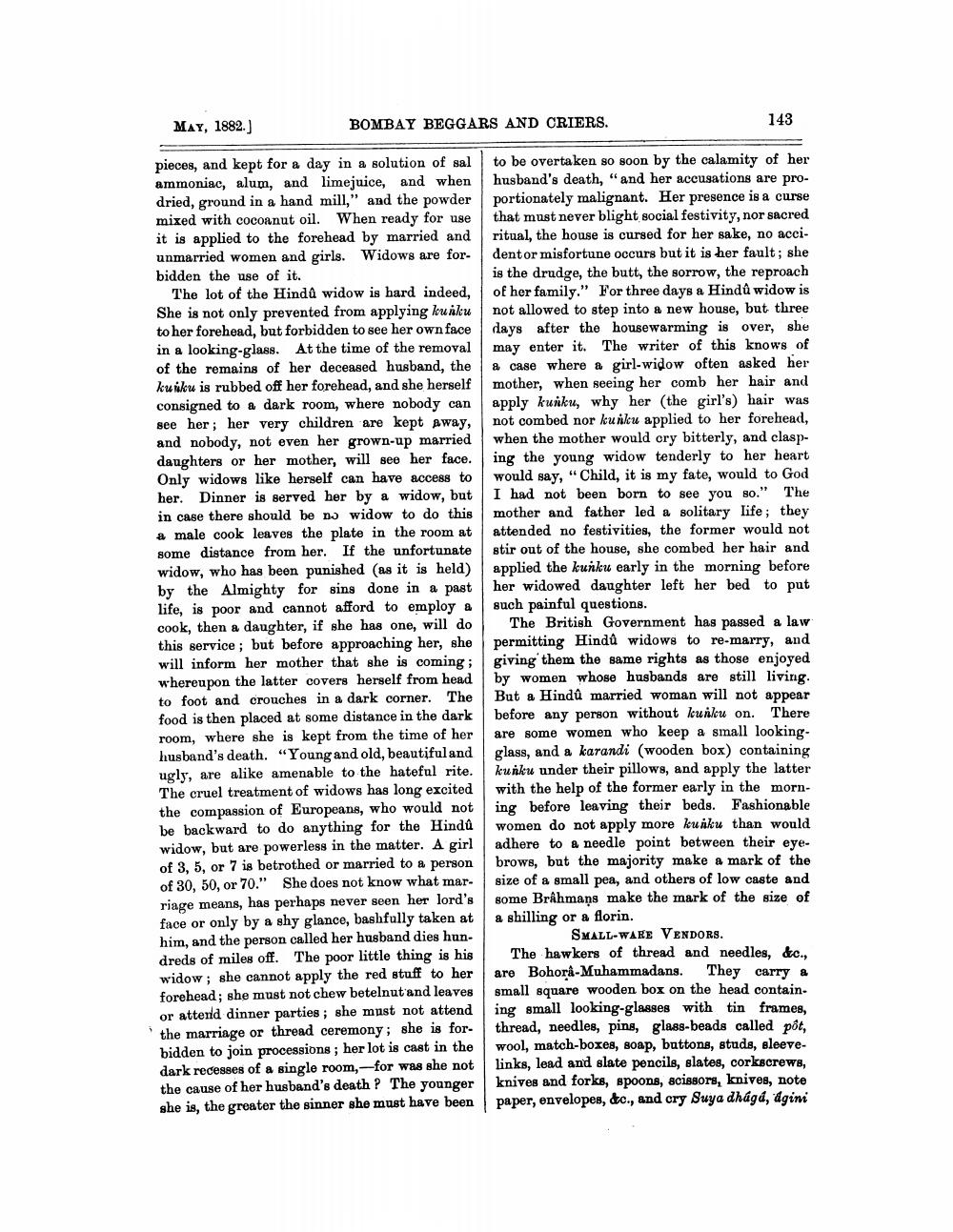________________
BOMBAY BEGGARS AND CRIERS.
MAY, 1882.]
pieces, and kept for a day in a solution of sal ammoniac, alum, and limejuice, and when dried, ground in a hand mill," and the powder mixed with cocoanut oil. When ready for use it is applied to the forehead by married and unmarried women and girls. Widows are forbidden the use of it.
The lot of the Hindû widow is hard indeed, She is not only prevented from applying kunku to her forehead, but forbidden to see her own face in a looking-glass. At the time of the removal of the remains of her deceased husband, the kunku is rubbed off her forehead, and she herself consigned to a dark room, where nobody can see her; her very children are kept away, and nobody, not even her grown-up married daughters or her mother, will see her face. Only widows like herself can have access to her. Dinner is served her by a widow, but in case there should be no widow to do this a male cook leaves the plate in the room at some distance from her. If the unfortunate widow, who has been punished (as it is held) by the Almighty for sins done in a past life, is poor and cannot afford to employ a cook, then a daughter, if she has one, will do this service; but before approaching her, she will inform her mother that she is coming; whereupon the latter covers herself from head to foot and crouches in a dark corner. The food is then placed at some distance in the dark room, where she is kept from the time of her husband's death. "Young and old, beautiful and ugly, are alike amenable to the hateful rite. The cruel treatment of widows has long excited the compassion of Europeans, who would not be backward to do anything for the Hindû widow, but are powerless in the matter. A girl of 3, 5, or 7 is betrothed or married to a person of 30, 50, or 70." She does not know what marriage means, has perhaps never seen her lord's face or only by a shy glance, bashfully taken at him, and the person called her husband dies hundreds of miles off. The poor little thing is his widow; she cannot apply the red stuff to her forehead; she must not chew betelnut and leaves or attend dinner parties; she must not attend the marriage or thread ceremony; she is forbidden to join processions; her lot is cast in the dark recesses of a single room,-for was she not the cause of her husband's death? The younger she is, the greater the sinner she must have been
143
to be overtaken so soon by the calamity of her husband's death, "and her accusations are proportionately malignant. Her presence is a curse that must never blight social festivity, nor sacred ritual, the house is cursed for her sake, no accident or misfortune occurs but it is her fault; she is the drudge, the butt, the sorrow, the reproach of her family." For three days a Hindu widow is not allowed to step into a new house, but three days after the housewarming is over, she may enter it. The writer of this knows of a case where a girl-widow often asked her mother, when seeing her comb her hair and apply kunku, why her (the girl's) hair was not combed nor kunku applied to her forehead, when the mother would cry bitterly, and clasping the young widow tenderly to her heart would say, "Child, it is my fate, would to God I had not been born to see you so." The mother and father led a solitary life; they attended no festivities, the former would not stir out of the house, she combed her hair and applied the kunku early in the morning before her widowed daughter left her bed to put such painful questions.
The British Government has passed a law permitting Hindû widows to re-marry, and giving them the same rights as those enjoyed by women whose husbands are still living. But a Hindû married woman will not appear before any person without kunku on. There are some women who keep a small lookingglass, and a karandi (wooden box) containing kunku under their pillows, and apply the latter with the help of the former early in the morning before leaving their beds. Fashionable women do not apply more kunku than would adhere to a needle point between their eyebrows, but the majority make a mark of the size of a small pea, and others of low caste and some Brahmans make the mark of the size of a shilling or a florin.
SMALL-WAKE VENDORS.
The hawkers of thread and needles, &c., are Bohorâ-Muhammadans. They carry a small square wooden box on the head containing small looking-glasses with tin frames, thread, needles, pins, glass-beads called pôt, wool, match-boxes, soap, buttons, studs, sleevelinks, lead and slate pencils, slates, corkscrews, knives and forks, spoons, scissors, knives, note paper, envelopes, &c., and cry Suya dhágá, agini




